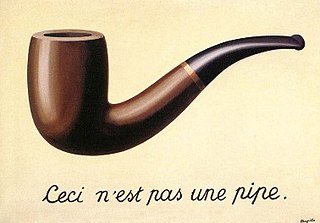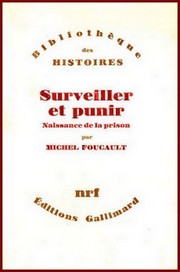Post-structuralism is a philosophical movement that questions the objectivity or stability of the various interpretive structures that are posited by structuralism and considers them to be constituted by broader systems of power. Although different post-structuralists present different critiques of structuralism, common themes include the rejection of the self-sufficiency of structuralism, as well as an interrogation of the binary oppositions that constitute its structures. Accordingly, post-structuralism discards the idea of interpreting media within pre-established, socially constructed structures.

Discourse is a generalization of the notion of a conversation to any form of communication. Discourse is a major topic in social theory, with work spanning fields such as sociology, anthropology, continental philosophy, and discourse analysis. Following work by Michel Foucault, these fields view discourse as a system of thought, knowledge, or communication that constructs our world experience. Since control of discourse amounts to control of how the world is perceived, social theory often studies discourse as a window into power. Within theoretical linguistics, discourse is understood more narrowly as linguistic information exchange and was one of the major motivations for the framework of dynamic semantics. In these expressions, ' denotations are equated with their ability to update a discourse context.

Political ecology is the study of the relationships between political, economic and social factors with environmental issues and changes. Political ecology differs from apolitical ecological studies by politicizing environmental issues and phenomena.

Paul-Michel Foucault was a French historian of ideas and philosopher who was also an author, literary critic, political activist, and teacher. Foucault's theories primarily addressed the relationships between power versus knowledge and liberty, and he analyzed how they are used as a form of social control through multiple institutions. Though often cited as a structuralist and postmodernist, Foucault rejected these labels and sought to critique authority without limits on himself. His thought has influenced academics within a large number of contrasting areas of study, with this especially including those working in anthropology, communication studies, criminology, cultural studies, feminism, literary theory, psychology, and sociology. His efforts against homophobia and racial prejudice as well as against other ideological doctrines have also shaped research into critical theory and Marxism–Leninism alongside other topics.
Intellectual history is the study of the history of human thought and of intellectuals, people who conceptualize, discuss, write about, and concern themselves with ideas. The investigative premise of intellectual history is that ideas do not develop in isolation from the thinkers who conceptualize and apply those ideas; thus the intellectual historian studies ideas in two contexts: (i) as abstract propositions for critical application; and (ii) in concrete terms of culture, life, and history.

The Foucault pendulum or Foucault's pendulum is a simple device named after French physicist Léon Foucault, conceived as an experiment to demonstrate the Earth's rotation. If a long and heavy pendulum suspended from the high roof above a circular area is monitored over an extended period of time, its plane of oscillation appears to change spontaneously as the Earth makes its 24-hourly rotation.
Queer theory is a field of post-structuralist critical theory that emerged in the early 1990s out of queer studies and women's studies. The term "queer theory" is broadly associated with the study and theorization of gender and sexual practices that exist outside of heterosexuality, and which challenge the notion that heterosexuality is what is normal. Following social constructivist developments in sociology, queer theorists are often critical of what they consider essentialist views of sexuality and gender. Instead, they study those concepts as social and cultural phenomena, often through an analysis of the categories, binaries, and language in which they are said to be portrayed.

Jean Bernard Léon Foucault was a French physicist best known for his demonstration of the Foucault pendulum, a device demonstrating the effect of Earth's rotation. He also made an early measurement of the speed of light, discovered eddy currents, and is credited with naming the gyroscope.
The concept of a carceral archipelago was first used by the French historian and philosopher Michel Foucault in his 1975 publication, Surveiller et Punir, to describe the modern penal system of the 1970s, embodied by the well-known penal institution at Mettray in France. The phrase combines the adjective "carceral", which means that which is related to jail or prison, with archipelago—a group of islands. Foucault referred to the "island" units of the "archipelago" as a metaphor for the mechanisms, technologies, knowledge systems and networks related to a carceral continuum. The 1973 English publication of the book by Solzhenitsyn called The Gulag Archipelago referred to the forced labor camps and prisons that composed the sprawling carceral network of the Soviet Gulag.

The History of Sexuality is a four-volume study of sexuality in the Western world by the French historian and philosopher Michel Foucault, in which the author examines the emergence of "sexuality" as a discursive object and separate sphere of life and argues that the notion that every individual has a sexuality is a relatively recent development in Western societies. The first volume, The Will to Knowledge, was first published in 1976; an English translation appeared in 1978. The Use of Pleasure and The Care of the Self were published in 1984. The fourth volume, Confessions of the Flesh, was published posthumously in 2018.
Governmentality is a concept first developed by the French philosopher Michel Foucault, roughly between 1977 and his death in 1984, particularly in his lectures at the Collège de France during this time.

The Treachery of Images is a 1929 painting by Belgian surrealist painter René Magritte. It is also known as This Is Not a Pipe, Ceci n'est pas une pipe and The Wind and the Song. It is on display at the Los Angeles County Museum of Art.

Discipline and Punish: The Birth of the Prison is a 1975 book by French philosopher Michel Foucault. It is an analysis of the social and theoretical mechanisms behind the changes that occurred in Western penal systems during the modern age based on historical documents from France. Foucault argues that prison did not become the principal form of punishment just because of the humanitarian concerns of reformists. He traces the cultural shifts that led to the predominance of prison via the body and power. Prison is used by the "disciplines" – new technological powers that can also be found, according to Foucault, in places such as schools, hospitals, and military barracks.
Biopower, coined by French social theorist Michel Foucault, refers to various means by which modern nation states control their populations. In Foucault's work, it has been used to refer to practices of public health, regulation of heredity, and risk regulation, among many other regulatory mechanisms often linked less directly with literal physical health. Foucault first used the term in his lecture courses at the Collège de France, and the term first appeared in print in The Will to Knowledge, Foucault's first volume of The History of Sexuality. It is closely related to a term he uses much less frequently, but which subsequent thinkers have taken up independently, biopolitics, which aligns more closely with the examination of the strategies and mechanisms through which human life processes are managed under regimes of authority over knowledge, power, and the processes of subjectivation.
Biopolitics is a concept popularized by the French philosopher Michel Foucault in the mid-20th century. At its core, biopolitics explores how governmental power operates through the management and regulation of a population's bodies and lives.

The Order of Things: An Archaeology of the Human Sciences is a book by French philosopher Michel Foucault. It proposes that every historical period has underlying epistemic assumptions, ways of thinking, which determine what is truth and what is acceptable discourse about a subject, by delineating the origins of biology, economics, and linguistics. The introduction to the origins of the human sciences begins with detailed, forensic analyses and discussion of the complex networks of sightlines, hidden-ness, and representation that exist in the group painting Las Meninas by Diego Velázquez. Foucault's application of the analyses shows the structural parallels in the similar developments in perception that occurred in researchers' ways of seeing the subject in the human sciences.

Heterotopia is a concept elaborated by philosopher Michel Foucault to describe certain cultural, institutional and discursive spaces that are somehow "other": disturbing, intense, incompatible, contradictory or transforming. Heterotopias are "worlds within worlds": both similar to their surroundings, and contrasting with or upsetting them. Foucault provides examples: ships, cemeteries, bars, brothels, prisons, gardens of antiquity, fairs, Muslim baths and many more. Foucault outlines the notion of heterotopia on three occasions between 1966 and 1967. A lecture given by Foucault to a group of architects in 1967 is the most well-known explanation of the term. His first mention of the concept is in his preface to The Order of Things, and refers to texts rather than socio-cultural spaces.

Thomas Lemke is a German sociologist and social theorist. He is best known for his work on Governmentality, Biopolitics and his readings of Michel Foucault. He is a Professor of Sociology with specialization in Biotechnologies, Nature and Society at the Faculty of Social Sciences at Goethe University Frankfurt, Frankfurt am Main, Germany.
Security, Territory, Population: Lectures at the Collège de France, 1977–1978 pertains to a lecture series given by French philosopher Michel Foucault at the Collège de France between 1977 and 1978 and published posthumously.

Foucault is a book by José Guilherme Merquior about the French philosopher Michel Foucault, first published in 1985.











